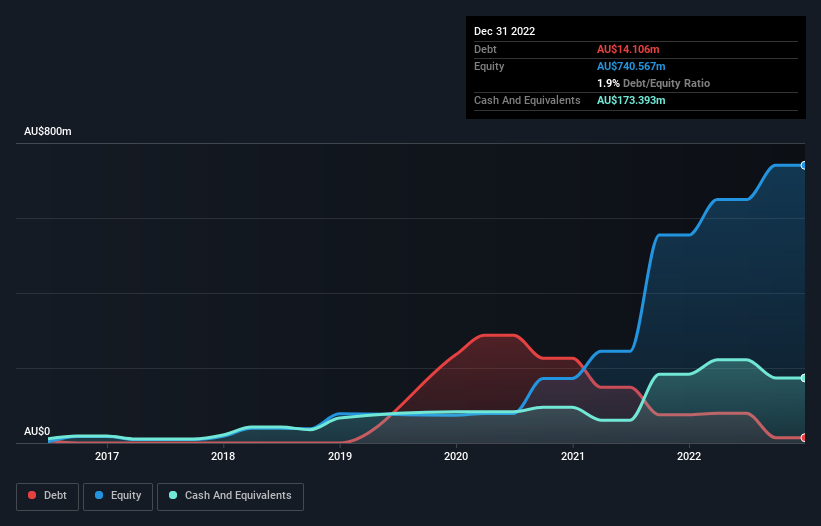- Australia
- /
- Metals and Mining
- /
- ASX:WAF
Here's Why West African Resources (ASX:WAF) Can Manage Its Debt Responsibly
The external fund manager backed by Berkshire Hathaway's Charlie Munger, Li Lu, makes no bones about it when he says 'The biggest investment risk is not the volatility of prices, but whether you will suffer a permanent loss of capital.' When we think about how risky a company is, we always like to look at its use of debt, since debt overload can lead to ruin. Importantly, West African Resources Limited (ASX:WAF) does carry debt. But the more important question is: how much risk is that debt creating?
When Is Debt Dangerous?
Debt assists a business until the business has trouble paying it off, either with new capital or with free cash flow. Ultimately, if the company can't fulfill its legal obligations to repay debt, shareholders could walk away with nothing. However, a more usual (but still expensive) situation is where a company must dilute shareholders at a cheap share price simply to get debt under control. Of course, the upside of debt is that it often represents cheap capital, especially when it replaces dilution in a company with the ability to reinvest at high rates of return. The first step when considering a company's debt levels is to consider its cash and debt together.
View our latest analysis for West African Resources
What Is West African Resources's Net Debt?
The image below, which you can click on for greater detail, shows that West African Resources had debt of AU$14.1m at the end of December 2022, a reduction from AU$75.0m over a year. However, its balance sheet shows it holds AU$173.4m in cash, so it actually has AU$159.3m net cash.

How Healthy Is West African Resources' Balance Sheet?
The latest balance sheet data shows that West African Resources had liabilities of AU$87.6m due within a year, and liabilities of AU$50.6m falling due after that. On the other hand, it had cash of AU$173.4m and AU$40.5m worth of receivables due within a year. So it actually has AU$75.8m more liquid assets than total liabilities.
This short term liquidity is a sign that West African Resources could probably pay off its debt with ease, as its balance sheet is far from stretched. Simply put, the fact that West African Resources has more cash than debt is arguably a good indication that it can manage its debt safely.
The modesty of its debt load may become crucial for West African Resources if management cannot prevent a repeat of the 33% cut to EBIT over the last year. Falling earnings (if the trend continues) could eventually make even modest debt quite risky. There's no doubt that we learn most about debt from the balance sheet. But it is future earnings, more than anything, that will determine West African Resources's ability to maintain a healthy balance sheet going forward. So if you're focused on the future you can check out this free report showing analyst profit forecasts.
Finally, a business needs free cash flow to pay off debt; accounting profits just don't cut it. West African Resources may have net cash on the balance sheet, but it is still interesting to look at how well the business converts its earnings before interest and tax (EBIT) to free cash flow, because that will influence both its need for, and its capacity to manage debt. In the last three years, West African Resources's free cash flow amounted to 34% of its EBIT, less than we'd expect. That's not great, when it comes to paying down debt.
Summing Up
While it is always sensible to investigate a company's debt, in this case West African Resources has AU$159.3m in net cash and a decent-looking balance sheet. So we are not troubled with West African Resources's debt use. There's no doubt that we learn most about debt from the balance sheet. But ultimately, every company can contain risks that exist outside of the balance sheet. Case in point: We've spotted 1 warning sign for West African Resources you should be aware of.
At the end of the day, it's often better to focus on companies that are free from net debt. You can access our special list of such companies (all with a track record of profit growth). It's free.
Valuation is complex, but we're here to simplify it.
Discover if West African Resources might be undervalued or overvalued with our detailed analysis, featuring fair value estimates, potential risks, dividends, insider trades, and its financial condition.
Access Free AnalysisHave feedback on this article? Concerned about the content? Get in touch with us directly. Alternatively, email editorial-team (at) simplywallst.com.
This article by Simply Wall St is general in nature. We provide commentary based on historical data and analyst forecasts only using an unbiased methodology and our articles are not intended to be financial advice. It does not constitute a recommendation to buy or sell any stock, and does not take account of your objectives, or your financial situation. We aim to bring you long-term focused analysis driven by fundamental data. Note that our analysis may not factor in the latest price-sensitive company announcements or qualitative material. Simply Wall St has no position in any stocks mentioned.
About ASX:WAF
West African Resources
Engages in the mining, mineral processing, acquisition, exploration, and project development of gold projects in West Africa.
Exceptional growth potential with flawless balance sheet.
Similar Companies
Market Insights
Community Narratives



